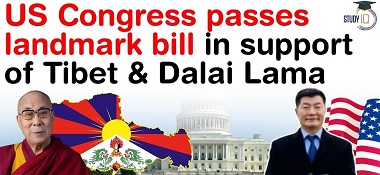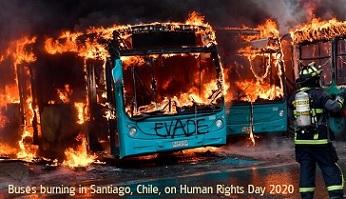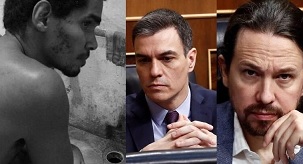La hija de Raúl Castro recibió procedente de EEUU cerca de 100 mil dólares en 2010 para la labor del Cenesex. No obstante, según altos jerarcas del régimen y su voceros, quienes se oponen a la "revolución" y su sistema unipartidista y totalitario son mercenarios que reciben dinero de Estados Unidos y pretenden la restauración capitalista en Cuba.
La Habana, Dic. 13 (DP.net).– Es evidente el doble rasero de los regímenes totalitarios donde "ellos" no pueden hacer lo que hacemos "nosotros". Desde las últimas semanas de 2020, el oficialismo cubano ha emprendido una .jpg) campaña mediática contra activistas, artistas, periodistas independientes y todos aquellos cubanos que, ya sea desde la isla o fuera de ella, han alzado su voz y protagonizado acciones de manifestación y protesta contra las arbitrariedades y la naturaleza dictatorial del régimen.
campaña mediática contra activistas, artistas, periodistas independientes y todos aquellos cubanos que, ya sea desde la isla o fuera de ella, han alzado su voz y protagonizado acciones de manifestación y protesta contra las arbitrariedades y la naturaleza dictatorial del régimen.
Una de las que más ha arremetido contra quienes se manifiesten o pronuncien a favor de más derechos y libertades en Cuba, sean opositores declarados o no, es precisamente Mariela Castro, uno de los rostros más visibles de la segunda generación del clan o dinastía que ha regido el presente y destino de Cuba durante los últimos 62 años.
Además, artículos, posts en redes sociales, editoriales sesgados y supuestas demostraciones y análisis de voceros como Humberto López en la emisión estelar del noticiero se suceden unos a otros en la inquisición mediática oficialista, esa que no da derecho de réplica ni margen para que los atacados o presuntos culpables y “malos” puedan defenderse y esgrimir sus motivos, razones o argumentos.
- Hits: 5095
 called on other countries to follow U.S. leadership in supporting Tibetans currently being persecuted by the Chinese regime.
called on other countries to follow U.S. leadership in supporting Tibetans currently being persecuted by the Chinese regime. marco del Día de los Derechos Humanos, las autoridades condenaron la quema de cuatro buses eléctricos en Alameda con Las Rejas.
marco del Día de los Derechos Humanos, las autoridades condenaron la quema de cuatro buses eléctricos en Alameda con Las Rejas. El Congreso de los Diputados de España rechazó condenar las detenciones arbitrarias de disidentes en Cuba, la segunda votación consecutiva en que los gubernamentales PSOE y Podemos hacen valer su mayoría y favorecen al castrismo.
El Congreso de los Diputados de España rechazó condenar las detenciones arbitrarias de disidentes en Cuba, la segunda votación consecutiva en que los gubernamentales PSOE y Podemos hacen valer su mayoría y favorecen al castrismo. Nehru was a blundering and impractical politician. He complicated not only Tibet and India’s North East, but also Jammu & Kashmir state. [The latter was left to the current prime minister, Narendra Modi, to act decisively and display courage and competence. He tackled its on-going separatist and terrorist “culture” and ended its “special status” by abrogating the temporary Article 370 of the Indian Constitution, and brought it in line with the other Indian states.] Nehru, in his idealistic fervor and utopian dreams, had not acted like a patriot or a statesman and had surrendered much to China and also to the separatist Kashmiri Muslims. In his era, the favorite political slogan was “Hindi–Chini bhai bhai” (“Indians and Chinese are brothers”). It proved to be one-sided and disastrous to India with a big betrayal by China.
Nehru was a blundering and impractical politician. He complicated not only Tibet and India’s North East, but also Jammu & Kashmir state. [The latter was left to the current prime minister, Narendra Modi, to act decisively and display courage and competence. He tackled its on-going separatist and terrorist “culture” and ended its “special status” by abrogating the temporary Article 370 of the Indian Constitution, and brought it in line with the other Indian states.] Nehru, in his idealistic fervor and utopian dreams, had not acted like a patriot or a statesman and had surrendered much to China and also to the separatist Kashmiri Muslims. In his era, the favorite political slogan was “Hindi–Chini bhai bhai” (“Indians and Chinese are brothers”). It proved to be one-sided and disastrous to India with a big betrayal by China.